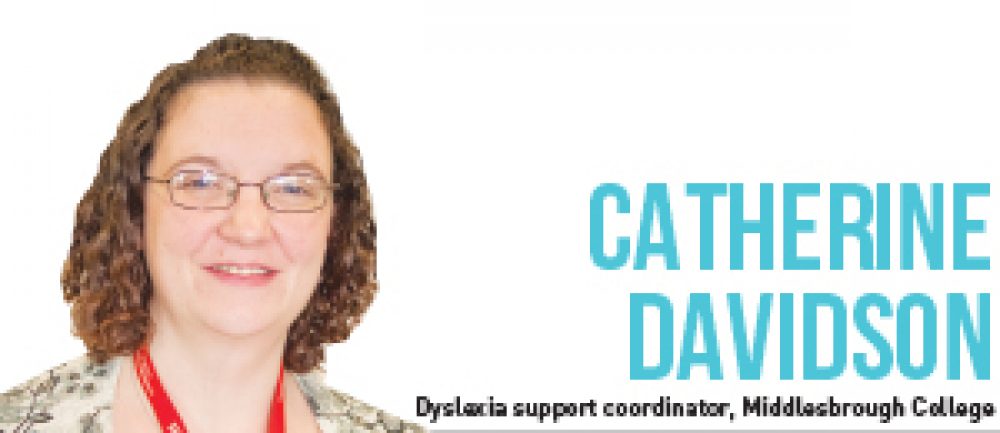Abandoning the term dyslexia could have far-reaching consequences. Catherine Davidson looks at the situation for college learners.
It is not just important that dyslexia is recognised in FE, it is essential.
When students attend FE, they often choose vocational subjects where they have a passion, ability and determination that they have never before experienced.
When students show this kind of talent in hands-on subjects, but struggle with the theory side, tutors notice that something is acting as a barrier to their learning and this is often when they receive a dyslexia assessment for the first time.
Even in academic subjects, such as A-levels, students often find a voice and find it easier to express their concerns as young adults who are taking ownership of their learning.
Middlesbrough College has assessed an average of 12 students per week so far this year and the majority of these are being informed that they might be dyslexic for the first time.
At Middlesbrough College students are offered a variety of support options.
A new additional learning support model means that students are offered support in a small group, delivered by specialist dyslexia tutors; support in class is delivered by a specialist dyslexia learning support assistant or a drop-in service, which is open to everyone and staffed by specialists.
The group support is as much about developing students’ strengths as overcoming their weaknesses.
Often students have been through other educational systems feeling left behind and de-motivated, despite their obvious potential
The emotional impact of dyslexia is also addressed, as often students have been through other educational systems feeling left behind and de-motivated, despite their obvious potential.
Part of the support process is to recognise the positives of dyslexia, concentrating on strengths and abilities alongside the difficulties with reading, spelling and memory that so often stop people from achieving.
Initially, the college’s new model offered support to students on a six-week basis, but the majority of students who have accessed the support have chosen to stay for the full year.
Students are also offered assistive technologies which may enable them to work to their full potential.
The college offers several drop-in sessions during the week and an open door policy in the Support Hub if students find themselves struggling with any aspect of their course and they would like help or just someone to talk to.
Students do not need a label to attend the drop-in and staff are welcomed here too if they have any questions or concerns they believe a specialist may be able to answer.
In my experience, the majority of students welcome a label and request an assessment; this often gives students the confidence to approach staff about their difficulties, to disclose where maybe they would not have done.
For mature students, it is even more vital.
Invariably the label of dyslexia offers an explanation for a lifetime of difficulties.
The label of dyslexia is what determines the funding for this support.
Without the label students would be unable to access these support services which so clearly work.
Last year, 90 per cent of all Middlesbrough College students who accessed dyslexia support achieved on their course, and in a growing Additional Learning Support Team which supports all students in the college, dyslexia is still the most accessed support service.
Whatever support students are offered it should be individual to the student themselves; characteristics of dyslexia are individual so support should reflect this.
The Additional Learning Support Department states in last year’s Self-Assessment Report: “We recognise that everyone’s needs are unique, we work with students to identify any barriers that exist and make every effort to overcome them.
“The college wants all students to have the same opportunities to achieve their full potential.”
The current trend for arguing against the term dyslexia does nothing for the hundreds of students of different age groups, educational and social economic backgrounds that access FE.
Whereas providing students with support offers them an opportunity to excel in their chosen vocation, to succeed academically or simply to have more confidence in themselves and their ability and surely this is worth recognising.
Catherine Davidson, dyslexia support coordinator, Middlesbrough College



Your thoughts